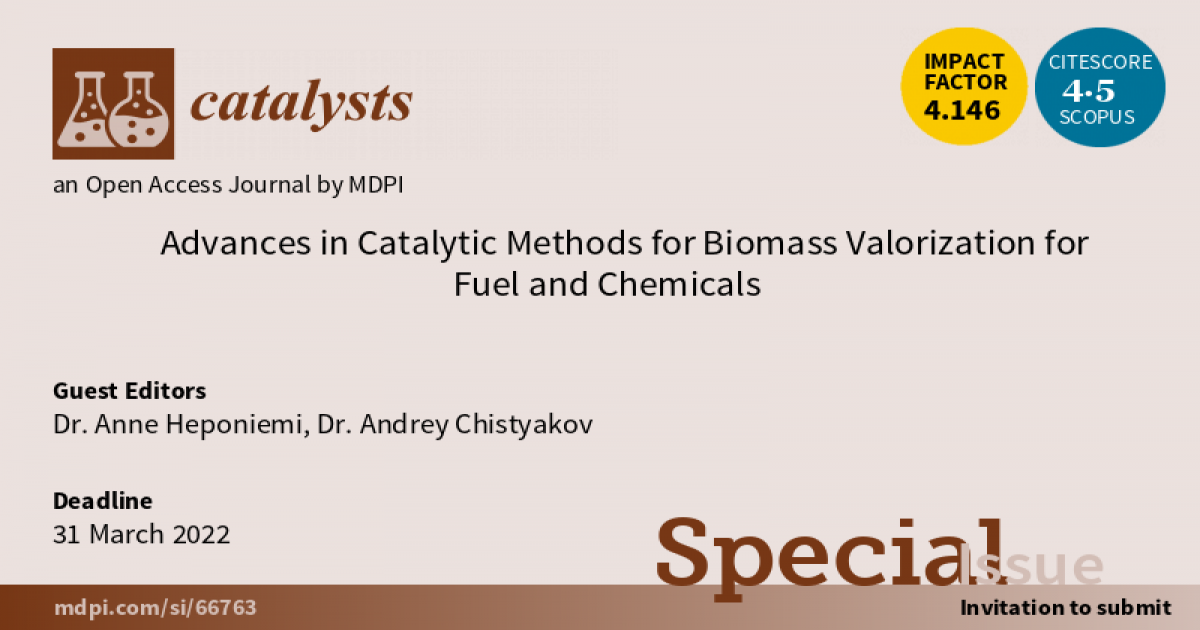Advances in Catalytic Methods for Biomass Valorization for Fuel and Chemicals
A special issue of Catalysts (ISSN 2073-4344). This special issue belongs to the section "Biomass Catalysis".
Deadline for manuscript submissions: closed (31 March 2022) | Viewed by 2862

Special Issue Editors
Interests: catalytic water treatment; advanced oxidation processes; industrial side streams and wastes valorization for valuables
Interests: catalysis; biomass treatment; green diesel; ethanol
Special Issues, Collections and Topics in MDPI journals
Special Issue Information
Dear Colleagues,
Biomass is the first source of energy, materials, and medicals for humanity. In the last century, interest in biomass processing has increased significantly, due to successes in microbiological synthesis, the development of technological and engineering methods for processing biomass (for example, ethanol and vegetable oils), and environmental friendliness of production. Despite the abundance of developments, only a small part of them reached industrial implementation, which shows the need to continue work on the creation of new catalysts and processes based on them.
This Special Issue aims to cover the most recent progress and the main challenges in biomass derivatives valorization. The main focus will be on modern catalytic approaches for the selective processing of ethanol, vegetable oils, including microalgae, biogas, lignin, and furfural.
I encourage you to share your new research results related to biomass catalytic valorization, including fuel components productions, platform molecules selective conversion to chemicals (furfural, ethanol, glycerol, vanillin, etc.), lignin gasification and liquefaction, and biogas involvement in production of organic molecules.
Dr. Anne Heponiemi
Dr. Andrey Chistyakov
Guest Editors
Manuscript Submission Information
Manuscripts should be submitted online at www.mdpi.com by registering and logging in to this website. Once you are registered, click here to go to the submission form. Manuscripts can be submitted until the deadline. All submissions that pass pre-check are peer-reviewed. Accepted papers will be published continuously in the journal (as soon as accepted) and will be listed together on the special issue website. Research articles, review articles as well as short communications are invited. For planned papers, a title and short abstract (about 100 words) can be sent to the Editorial Office for announcement on this website.
Submitted manuscripts should not have been published previously, nor be under consideration for publication elsewhere (except conference proceedings papers). All manuscripts are thoroughly refereed through a single-blind peer-review process. A guide for authors and other relevant information for submission of manuscripts is available on the Instructions for Authors page. Catalysts is an international peer-reviewed open access monthly journal published by MDPI.
Please visit the Instructions for Authors page before submitting a manuscript. The Article Processing Charge (APC) for publication in this open access journal is 2700 CHF (Swiss Francs). Submitted papers should be well formatted and use good English. Authors may use MDPI's English editing service prior to publication or during author revisions.
Keywords
- ethanol
- algae oil
- greendiesel
- linear alpha-alcohols
- butadiene
- fuels
- chemicals
- biomass
- furfural






